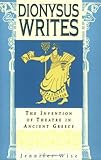Dionysus Writes : The Invention of Theatre in Ancient Greece / Jennifer Wise.
Material type: TextPublisher: Ithaca, NY : Cornell University Press, [2019]Copyright date: ©2000Description: 1 online resource (288 p.) : 6 drawingsContent type:
TextPublisher: Ithaca, NY : Cornell University Press, [2019]Copyright date: ©2000Description: 1 online resource (288 p.) : 6 drawingsContent type: - 9780801486937
- 9781501744945
- Greek drama -- History and criticism -- Theory, etc
- Invention (Rhetoric) -- History -- To 1500
- Literacy -- Greece -- History -- To 1500
- Literary form -- History -- To 1500
- Theater -- Greece -- History -- To 500
- Written communication -- Greece -- History -- To 1500
- Ancient History & Classical Studies
- Performing Arts & Drama
- HISTORY / Ancient / Greece
- 792/.0938 22
- PA3201 .W57 1998eb
- online - DeGruyter
- Issued also in print.
| Item type | Current library | Call number | URL | Status | Notes | Barcode | |
|---|---|---|---|---|---|---|---|
 eBook
eBook
|
Biblioteca "Angelicum" Pont. Univ. S.Tommaso d'Aquino Nuvola online | online - DeGruyter (Browse shelf(Opens below)) | Online access | Not for loan (Accesso limitato) | Accesso per gli utenti autorizzati / Access for authorized users | (dgr)9781501744945 |
Frontmatter -- Contents -- Acknowledgments -- Introduction: The Theoretical Problem -- Chapter 1: The ABCs Of Acting -- Chapter 2: The Student Body -- Chapter 3: Courtroom Dramas -- Chapter 4: Economies Of Inscription -- Conclusion: Theatre And Technology -- Bibliography -- Index
restricted access online access with authorization star
http://purl.org/coar/access_right/c_16ec
What is the nature of theatre's uneasy alliance with literature? Should theatre be viewed as a preliterate, ritualistic phenomenon that can only be compromised by writing? Or should theatre be grouped with other literary arts as essentially'textual,'with even physical performance subsumed under the aegis of textuality? Jennifer Wise, a theatre historian and drama theorist who is also an actor, director, and designer, responds with a challenging and convincing reconstruction of the historical context from which Western theatre first emerged.Wise believes that a comparison of the performance style of oral epic with that of drama as it emerged in sixth-century Greece shows the extent to which theatre was influenced by literate activities relatively new to the ancient world. These activities, foreign to Homer yet familiar to Aeschylus and his contemporaries, included the use of the alphabet, the teaching of texts in schools, the public inscription of laws, the sending and receiving of letters, the exchange of city coinage, and the making of lists. Having changed the way cultural material was processed and transmitted, the technology of writing also led to innovations in the way stories were told, and Wise contends that theatre was the result. However, the art of drama appeared in ancient Greece not only as a beneficiary of literacy but also in defiance of any tendency to see textuality as an end in itself.
Issued also in print.
Mode of access: Internet via World Wide Web.
In English.
Description based on online resource; title from PDF title page (publisher's Web site, viewed 02. Mrz 2022)


